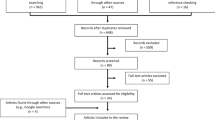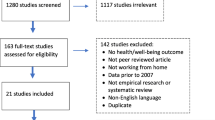Abstract
Purpose
The aim of this study was to investigate the risk factors for absenteeism due to mental health problems with regard to company characteristics and systems for return to work in Japan.
Methods
This was an Internet-based unmatched case–control study. Two hundred and fifty-eight workers who experienced over 28 days of sick leave due to mental health problems (cases) and 258 workers who have not taken sick leave (controls) were recruited. Company characteristics and the awareness and presence of systems for return to work were analysed as indicators of absenteeism.
Results
A total of 501 workers were included in the analysis. Females were less likely to experience absenteeism when adjustments were made for both the awareness and presence of systems [odds ratio (OR) = 0.51 and 0.41, respectively]. Large companies showed an increased risk of having absentee workers than small companies. The awareness of a gradual resumption system and the presence of a sick pay system were related to absenteeism (OR = 2.75 and 2.40, respectively).
Conclusions
The awareness and presence of systems for return to work are related to the long-term absenteeism. The predictors of sex and company size are also related to the experience of the long-term absenteeism. To understand the effect of systems for return to work on absenteeism due to mental problems, further studies are needed.
Similar content being viewed by others
References
Act on the Protection of Personal Information, Japan. Chapter IV (2003) http://law.e-gov.go.jp/htmldata/H15/H15HO057.html. Accessed 26 July 2016
Angst J (1997) Fortnightly review. A regular review of the long-term follow up of depression. BMJ 315:1143–1146
Arends I, Bruinvels DJ, Rebergen DS, Nieuwenhuijsen K, Madan I, Neumeyer-Gromen A, Bültmann U, Verbeek JH (2012) Interventions to facilitate return to work in adults with adjustment disorders. Cochrane Database Syst Rev. doi:10.1002/14651858.CD006389.pub2
Arends I, van der Klink JJ, van Rhenen W, de Boer MR, Bültmann U (2014) Predictors of recurrent sickness absence among workers having returned to work after sickness absence due to common mental disorders. Scand J Work Environ Health 40:195–202. doi:10.5271/sjweh.3384
Bakker IM, Terluin B, van Marwijk HW, van der Windt DA, Rijmen F, van Mechelen W, Stalman WA (2007) A cluster-randomised trial evaluating an intervention for patients with stress-related mental disorders and sick leave in primary care. PLoS Clin Trials 2(6):e26. doi:10.1371/journal.pctr.0020026
Brown J, Gilmour WH, Macdonald EB (2006) Ill health retirement in Scottish teachers: process, outcomes and re-employment. Int Arch Occup Environ Health 79(5):433–440
Corbière M, Samson E, Negrini A, St-Arnaud L, Durand MJ, Coutu MF, Sauvé G, Lecomte T (2016) Factors perceived by employees regarding their sick leave due to depression. Disabil Rehabil 38(6):511–519. doi:10.3109/09638288.2015.1046564
Doki S, Sasahara S, Matsuzaki I (2015a) Psychological approach of occupational health service to sick leave due to mental problems: a systematic review and meta-analysis. Int Arch Occup Environ Health 88(6):659–667. doi:10.1007/s00420-014-0996-8
Doki S, Sasahara S, Suzuki S, Hirai Y, Oi Y, Usami K, Matsuzaki I (2015b) Relationship between sickness presenteeism and awareness and presence or absence of systems for return to work among workers with mental health problems in Japan: an internet-based cross-sectional study. J Occup Health 57(6):532–539. doi:10.1539/joh.15-0083-OA
Ekberg K, Wåhlin C, Persson J, Bernfort L, Öberg B (2015) Early and late return to work after sick leave: predictors in a cohort of sick-listed individuals with common mental disorders. J Occup Rehabil 25(3):627–637. doi:10.1007/s10926-015-9570-9
Ervasti J, Vahtera J, Virtanen P, Pentti J, Oksanen T, Ahola K, Kivimäki M, Virtanen M (2014) Is temporary employment a risk factor for work disability due to depressive disorders and delayed return to work? The Finnish Public Sector Study. Scand J Work Environ Health 40(4):343–352. doi:10.5271/sjweh.3424
Flach PA, Groothoff JW, Krol B, Bültmann U (2012) Factors associated with first return to work and sick leave durations in workers with common mental disorders. Eur J Public Health 22(3):440–445. doi:10.1093/eurpub/ckr102
Franche RL, Cullen K, Clarke J, Irvin E, Sinclair S, Frank J, Institute for Work & Health (IWH) Workplace-Based RTW Intervention Literature Review Research Team (2005) Workplace-based return-to-work interventions: a systematic review of the quantitative literature. J Occup Rehabil 15(4):607–631
Garbarino S, Cuomo G, Chiorri C, Magnavita N (2013) Association of work-related stress with mental health problems in a special police force unit. BMJ Open 3(7):pii: e002791. doi:10.1136/bmjopen-2013-002791
Glise K, Hadzibajramovic E, Jonsdottir IH, Ahlborg G Jr (2010) Self-reported exhaustion: a possible indicator of reduced work ability and increased risk of sickness absence among human service workers. Int Arch Occup Environ Health 83(5):511–520. doi:10.1007/s00420-009-0490-x
Hees HL, de Vries G, Koeter MW, Schene AH (2013) Adjuvant occupational therapy improves long-term depression recovery and return-to-work in good health in sick-listed employees with major depression: results of a randomised controlled trial. Occup Environ Med 70(4):252–260. doi:10.1136/oemed-2012-100789
Joosen MC, Brouwers EP, van Beurden KM, Terluin B, Ruotsalainen JH, Woo JM, Choi KS, Eguchi H, Moriguchi J, van der Klink JJ, van Weeghel J (2015) An international comparison of occupational health guidelines for the management of mental disorders and stress-related psychological symptoms. Occup Environ Med 72(5):313–322. doi:10.1136/oemed-2013-101626
Kant IJ, Jansen NW, van Amelsvoort LG, Swaen GM, van Leusden R, Berkouwer A (2009) Screening questionnaire Balansmeter proved successful in predicting future long-term sickness absence in office workers. J Clin Epidemiol 62(4):408–414.e2. doi:10.1016/j.jclinepi.2008.07.003
Koopmans PC, Roelen CA, Groothoff JW (2008) Sickness absence due to depressive symptoms. Int Arch Occup Environ Health 81(6):711–719
Lindberg P, Josephson M, Alfredsson L, Vingård E (2009) Comparisons between five self-administered instruments predicting sick leaves in a 4-year follow-up. Int Arch Occup Environ Health 82(2):227–234. doi:10.1007/s00420-008-0326-0
Magnavita N, Garbarino S (2013) Is absence related to work stress? A repeated cross-sectional study on a special police force. Am J Ind Med 56(7):765–775. doi:10.1002/ajim.22155
Martindale AM, Woolf S, Stanistreet D, Gabbay M (2009) Sickness absence in the UK: welfare reform, measurement and statutory sick pay. Occup Med (Lond) 59(4):215–217. doi:10.1093/occmed/kqp005
Mather L, Bergström G, Blom V, Svedberg P (2015) High job demands, job strain, and iso-strain are risk factors for sick leave due to mental disorders: a prospective Swedish twin study with a 5-year follow-up. J Occup Environ Med 57(8):858–865. doi:10.1097/JOM.0000000000000504
Ministry of Health Labour and Welfare (2009) Manual of support for RTW of workers absent with mental health problems. Ministry of Health Labour and Welfare, Japan
Ministry of Health Labour and Welfare (2014) The Industrial Safety and Health Act. Ministry of Health Labour and Welfare, Japan. http://law.e-gov.go.jp/htmldata/S47/S47HO057.html. Accessed 14 July 2016
Muto T, Sumiyoshi Y, Sawada S, Momotani H, Itoh I, Fukuda H, Taira M, Kawagoe S, Watanabe G, Minowa H, Takeda S (1999) Sickness absence due to mental disorders in Japanese workforce. Ind Health 37(2):243–252
NICE public health guidance (2009) Workplace health: long-term sickness absence and incapacity to work. NHS National Institute for health and Clinical Excellence. https://www.nice.org.uk/guidance/ph19. Accessed 14 July 2016
Niedhammer I, Chastang JF, Sultan-Taïeb H, Vermeylen G, Parent-Thirion A (2013) Psychosocial work factors and sickness absence in 31 countries in Europe. Eur J Public Health. 23(4):622–629. doi:10.1093/eurpub/cks124
Nielsen MB, Madsen IE, Bültmann U, Christensen U, Diderichsen F, Rugulies R (2013) Encounters between workers sick-listed with common mental disorders and return-to-work stakeholders. Does workers’ gender matter? Scand J Public Health 41(2):191–197. doi:10.1177/1403494812470750
Noordik E, van der Klink JJ, Geskus RB, de Boer MR, van Dijk FJ, Nieuwenhuijsen K (2013) Effectiveness of an exposure-based return-to-work program for workers on sick leave due to common mental disorders: a cluster-randomized controlled trial. Scand J Work Environ Health 39(2):144–154. doi:10.5271/sjweh.3320
Okumura Y, Higuchi T (2011) Cost of depression among adults in Japan. Prim Care Companion CNS Disord 13(3):pii: PCC.10m01082. doi:10.4088/PCC.10m01082
Reis RJ, Utzet M, La Rocca PF, Nedel FB, Martín M, Navarro A (2011) Previous sick leaves as predictor of subsequent ones. Int Arch Occup Environ Health 84(5):491–499. doi:10.1007/s00420-011-0620-0
Statistics Bureau, Ministry of Internal Affairs and Communications (2015) Labour Force Survey, 2014. http://www.stat.go.jp/data/roudou/report/2014/index.htm. Accessed 14 July 2016
van Oostrom SH, Heymans MW, de Vet HC, van Tulder MW, van Mechelen W, Anema JR (2010) Economic evaluation of a workplace intervention for sick-listed employees with distress. Occup Environ Med 67:603–610. doi:10.1136/oem.2009.051979
Vingård E, Lindberg P, Josephson M, Voss M, Heijbel B, Alfredsson L, Stark S, Nygren A (2005) Long-term sick-listing among women in the public sector and its associations with age, social situation, lifestyle, and work factors: a three-year follow-up study. Scand J Public Health 33(5):370–375
Vlasveld MC, van der Feltz-Cornelis CM, Adèr HJ, Anema JR, Hoedeman R, van Mechelen W, Beekman AT (2013) Collaborative care for sick-listed workers with major depressive disorder: a randomised controlled trial from the Netherlands depression initiative aimed at return to work and depressive symptoms. Occup Environ Med 70:223–230. doi:10.1136/oemed-2012-100793
Wada K, Arakida M, Watanabe R, Negishi M, Sato J, Tsutsumi A (2013) The economic impact of loss of performance due to absenteeism and presenteeism caused by depressive symptoms and comorbid health conditions among Japanese workers. Ind Health 51(5):482–489
Willert MV, Thulstrup AM, Bonde JP (2011) Effects of a stress management intervention on absenteeism and return to work—results from a randomized wait-list controlled trial. Scand J Work Environ Health 37:186–195. doi:10.5271/sjweh.3130
World Health Organization (2007) Workers’ health: global plan of action. World Health Organization, Geneva. http://www.who.int/occupational_health/WHO_health_assembly_en_web.pdf. Accessed 12 February 2016
Acknowledgments
This study was partially supported by JSPS KAKENHI Grant No. 24689024.
Author information
Authors and Affiliations
Corresponding author
Ethics declarations
Conflict of interest
The authors declare that there is no conflict of interest.
Additional information
Shotaro Doki and Shinichiro Sasahara have been contributed equally.
Rights and permissions
About this article
Cite this article
Doki, S., Sasahara, S., Hirai, Y. et al. Absenteeism due to mental health problems and systems for return to work: an internet-based unmatched case–control study. Int Arch Occup Environ Health 89, 1279–1287 (2016). https://doi.org/10.1007/s00420-016-1162-2
Received:
Accepted:
Published:
Issue Date:
DOI: https://doi.org/10.1007/s00420-016-1162-2




